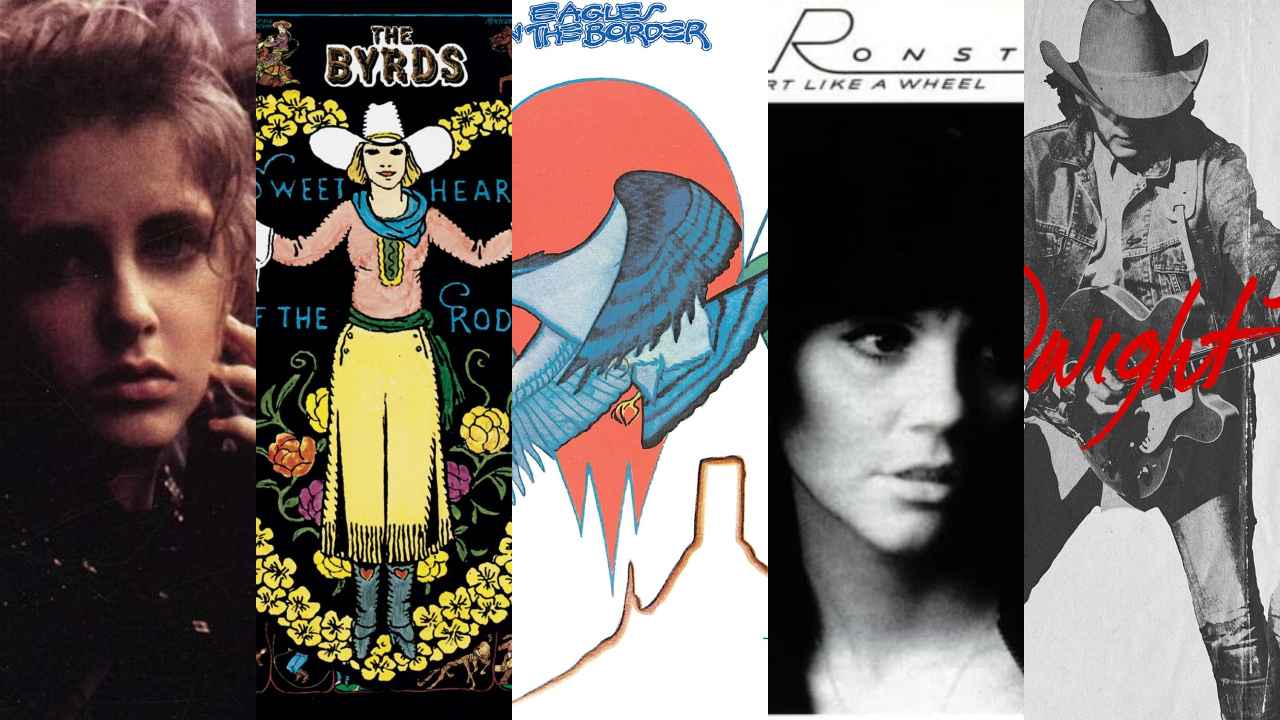A beginner’s guide to country rock in five essential albums
Five must-hear albums that answer the burning question: what is country rock?

Country rock. The two words fall in that order for stylistic reasons. The emphasis is on the cornerstones of country music – direct appeals to the heart, storytelling and twang. The rock part is mostly to do with an amplifier volume that would offend the Grand Ole Opry and a sense of embroidered sartorial style that wouldn't. Birthed in mid-1960s California, it has proved to be a perennial genre and one that is now the guiding light of the whole Americana movement. Here's a country rock starter kit.

The Byrds – Sweetheart Of The Rodeo (1968)
Country rock was in the air in the mid-'60s – Baby's In Black by The Beatles, High And Dry by The Rolling Stones, and No Vacancy by Rick Nelson are all early examples. But the first cohesive statement was by The Byrds. Originally conceived by guitarist Roger McGuinn as a double-album exploration of American music, from ragtime to jazz to bluegrass, Sweetheart Of The Rodeo was co-opted by new band member Gram Parsons. Drawing from his love of old country, Parsons led the way with his songs Hickory Wind and One Hundred Years From Now, while drafting in Nashville cats like fiddler John Hartford and steel guitarist Lloyd Green. Upon its release, the album was dismissed as too country for rock, too rock for country. Today, it's a beacon for countless country and Americana artists.
The Eagles – On The Border (1974)
What does country rock sound like? The first fifty seconds of opener Already Gone provide a good answer. A tangy twist of electric guitar riffs gives way to Glenn Frey's comfy, faded Levi's voice, then ramps into a power-glide, harmony-soaked chorus. There's a bit of the old bluegrass “high lonesome” sound in there too, giving it a happy-sad tug. Though the Eagles’ third album is now seen as a bridge to their AOR hit-making future, it has some of their most memorable country rock moments – James Dean, Good Day In Hell and the Don Henley vocal showcase, a cover of Tom Waits's Ol' 55.
Linda Ronstadt – Heart Like A Wheel (1975)
Ronstadt's voice is a thing of wonder. Pure, perfectly-pitched, and always with a melancholy undertow. As she proved over a long career, she could sing anything from Gilbert & Sullivan to Sinatra. But country rock was her sweet spot. On this, one of her best records, she spreads her interpretative net wide to include songwriters Paul Anka (It Doesn't Matter Anymore), Hank Williams (I Can't Help It If I'm Still In Love With You), Lowell George (Willin') and James Taylor (You Can Close Your Eyes). The stellar studio band is a who's who of country rock, including J.D. Souther, David Lindley and Emmylou Harris.
Lone Justice – Lone Justice (1985)
Dolly Parton was a fan. Tom Petty wrote songs for them. And they opened for U2. For such a promising resume, Lone Justice only managed to hold it together for two albums before they split. Darlings of L.A.'s cowpunk scene, they were all twang and tough cookie attitude. Charismatic lead singer Maria McKee looked like she could've been Elvis's lovechild, and she shared the King's bravado for channeling country and R & B into a sound that felt like Memphis on a steamy August night. Their debut – featuring the punchy strut of Ways To Be Wicked and the Stax-like balladry of Don't Toss Us Away - remains essential listening.
Dwight Yoakam – Second Hand Heart (2015)
Shunned by Nashville in the early '80s as “too hillbilly,” Yoakam headed west, plunging into the heart of L.A.'s cowpunk movement. He sharpened his sound, then a few years later, brought it back to Music Row, with platinum-selling, gleeful revenge. A mash-up of Buck Owens, Bob Dylan and Beggars' Banquet-era Stones, Yoakam's records have always been steeped in country rock vibes. But Second Hand Heart, his 16th album, is definitive. Highlights abound: the crashing Byrds-y jangle of She, the petal-to-the-metal cover of Man Of Constant Sorrow and the title track's affecting story of two love refugees, set against a California sunset groove.
Sign up below to get the latest from Classic Rock, plus exclusive special offers, direct to your inbox!
Bill DeMain is a correspondent for BBC Glasgow, a regular contributor to MOJO, Classic Rock and Mental Floss, and the author of six books, including the best-selling Sgt. Pepper At 50. He is also an acclaimed musician and songwriter who's written for artists including Marshall Crenshaw, Teddy Thompson and Kim Richey. His songs have appeared in TV shows such as Private Practice and Sons of Anarchy. In 2013, he started Walkin' Nashville, a music history tour that's been the #1 rated activity on Trip Advisor. An avid bird-watcher, he also makes bird cards and prints.

